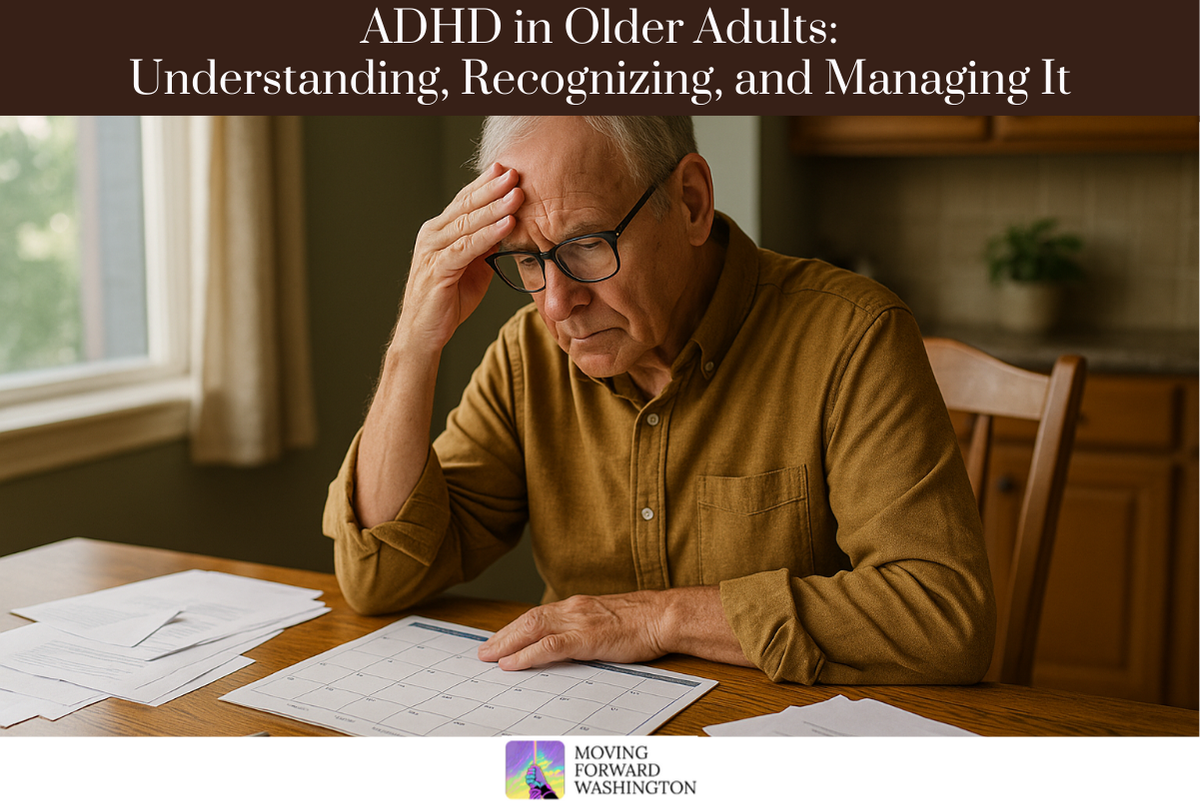 When most people think of Attention-Deficit/Hyperactivity Disorder (ADHD), they picture children who struggle to sit still in class or adolescents who have trouble focusing on schoolwork. However, ADHD doesn’t disappear with age—it often persists into adulthood, and in many cases, remains undiagnosed until later in life. For older adults, the challenges of ADHD can look different than in children, but they are no less significant.
When most people think of Attention-Deficit/Hyperactivity Disorder (ADHD), they picture children who struggle to sit still in class or adolescents who have trouble focusing on schoolwork. However, ADHD doesn’t disappear with age—it often persists into adulthood, and in many cases, remains undiagnosed until later in life. For older adults, the challenges of ADHD can look different than in children, but they are no less significant.
At Moving Forward Washington PLLC, we believe that awareness and tailored support can make a real difference for adults navigating ADHD in their 50s, 60s, and beyond.
How ADHD Presents in Older Adults
Older adults with ADHD may not be hyperactive in the way children often are. Instead, symptoms tend to manifest as:
- Chronic distractibility – trouble focusing on conversations, reading, or tasks.
- Memory concerns – frequently misplacing items, forgetting appointments, or losing track of details.
- Disorganization – difficulty managing bills, schedules, or home responsibilities.
- Emotional regulation issues – frustration, irritability, or mood swings.
- Restlessness – difficulty relaxing, even in retirement.
Because these symptoms may overlap with age-related cognitive changes, ADHD in older adults is often overlooked or mistaken for early dementia or normal aging.
Why Diagnosis Matters
For older adults, an ADHD diagnosis can be transformative. Understanding the source of long-standing struggles helps reduce shame and frustration while opening the door to effective treatments. These may include:
- Therapy and coaching to improve organization, planning, and coping strategies.
- Medication management to help regulate attention and impulsivity.
- Lifestyle strategies such as exercise, structured routines, and mindfulness practices.
Comprehensive Q&A: ADHD in Older Adults
Q: Can you develop ADHD later in life?
A: ADHD is a neurodevelopmental disorder, meaning it begins in childhood. However, many adults are not diagnosed until much later because symptoms were missed or masked earlier in life.
Q: How can ADHD be distinguished from age-related memory loss?
A: Memory issues in ADHD often relate to distraction (not encoding the information in the first place), whereas dementia involves progressive loss of stored memories. A thorough evaluation by a mental health professional can help differentiate the two.
Q: Is medication safe for older adults with ADHD?
A: Stimulant and non-stimulant medications can be effective, but treatment must be carefully tailored, especially if other health conditions (such as high blood pressure or heart disease) are present. At Moving Forward Washington PLLC, we work closely with patients to ensure safety and effectiveness.
Q: Can therapy really help with ADHD in later life?
A: Yes. Cognitive-behavioral therapy (CBT) and ADHD-focused coaching can provide practical tools for managing symptoms, improving daily functioning, and reducing stress.
Q: What steps can older adults take at home to cope with ADHD?
A: Simple strategies like using calendars and reminders, breaking tasks into smaller steps, and maintaining consistent routines can make a big difference.
Moving Forward With Support
ADHD does not have to define your later years. With proper evaluation and personalized treatment, many older adults find relief and improvement in both daily functioning and quality of life.
Contact Information
Moving Forward Washington PLLC
1721 Hewitt Avenue, Suite 506
Everett, WA, 98201
📞 (425) 407-2771
🌐 movingforwardwashington.com
